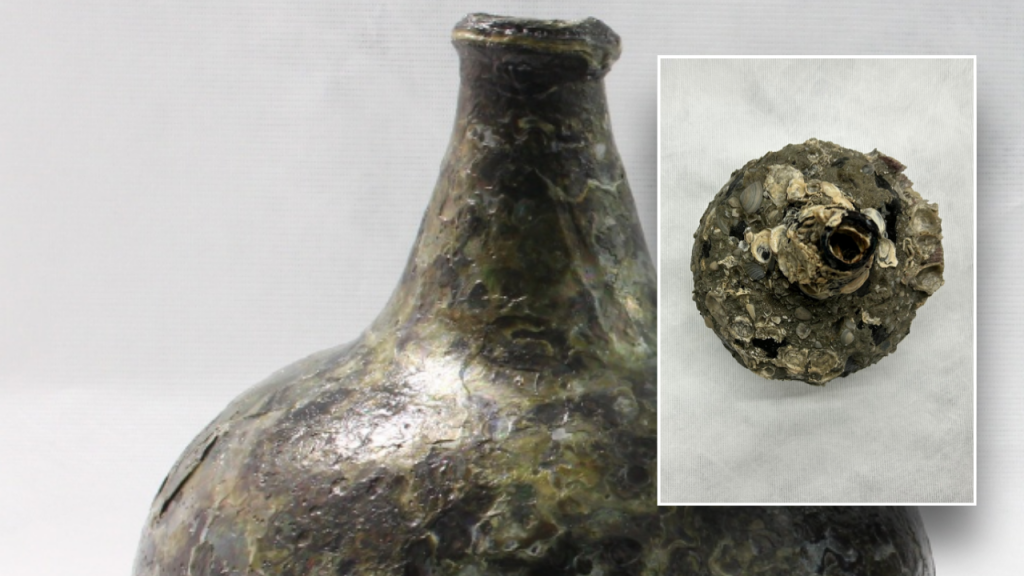Florida officials recently announced the discovery of two 18th-century “onion glasses” found in waters outside of the Sunshine State. The Florida Division of Historical Resources made the announcement on Oct. 8 in a social media post showcasing the recent restoration of the artifacts. The bottles were recovered from a shipwreck off the coast of Indian River County in 2021 and 2022, but the exact ship has not been identified. It is believed to have been part of the Spanish Plate Fleet that was sailing from Cuba bound for Spain in 1715. The fleet was lost at sea along Florida’s east coast after encountering a hurricane. The discovery of the intact bottles, believed to have once held some alcoholic spirit, is considered rare given their fragility and the challenges of surviving underwater for over 300 years. The bottles are presumed to have been produced in England and were likely carried as cargo on the ship as well as used by the crew and passengers.
The Director of External Affairs of the Florida Department of State, Mark Ard, described the onion bottles as unique and handmade by skilled craftspeople. Onion bottles were free-blown using a pontile, resulting in variations in size, shape, and weight. The bottles were an important part of global maritime trade in the 18th century, carrying goods and raw materials from Central and Southern America, as well as Asia. The Spanish treasure fleet played a crucial role in the economies of Spain and other European nations, transporting goods like chocolate that influenced social habits. The bottles, now available for loan as part of the Artifact Loan Program, can be seen at various exhibits in Florida, highlighting the historical significance of the Spanish Plate Fleet and its impact on global trade and cultural exchange.
The successful restoration of the onion bottles was attributed to meticulous cleaning and drying techniques, followed by consolidation with an acrylic resin-based consolidant. The bottles were cleaned slowly to remove barnacles and other debris, allowing them to remain intact and preserved. The resilience of the bottles, considering the circumstances of surviving a shipwreck, being submerged for over 300 years, and enduring tidal forces, is considered remarkable. Each onion bottle was handcrafted, making them unique pieces that would have been used both as cargo and by the crew and passengers onboard. The bottles provide valuable insights into 18th-century craftsmanship and the importance of trade routes in connecting different regions of the world.
The discovery of the onion glasses sheds light on the history of the Spanish Plate Fleet and its role in global maritime trade during the 18th century. The fleet’s loss at sea in 1715 due to a hurricane highlights the risks faced by ships navigating the treacherous waters off Florida’s east coast. The artifacts, believed to have contained alcoholic spirits, offer a glimpse into the drinking habits of the time, with onion bottles playing a dual role as cargo containers and drinking vessels. The careful restoration and preservation of these fragile bottles allow modern-day audiences to appreciate the craftsmanship and historical significance of these artifacts, which are now showcased in various museums across Florida for public viewing.
The importance of the Spanish treasure fleet, including the goods it transported from the Americas and Asia, is underscored by the impact on social habits and economic trade routes. The flow of goods, such as chocolate, from Central and Southern America fundamentally changed consumption patterns in Europe and beyond. The use of specific porcelain vessels made in China to serve drinking chocolate highlights the interconnectedness of different regions through trade and cultural exchange facilitated by maritime routes. The onion bottles serve as tangible reminders of the past, linking present-day audiences to a bygone era of exploration and commerce that shaped the global economy and cultural practices.
The onion glasses now available for loan through the Artifact Loan Program offer opportunities for the public to engage with history and learn about the maritime heritage of Florida. The exhibits at museums like History Miami, the Pensacola Museum of History, and the McLarty Treasure Museum allow visitors to see firsthand the craftsmanship and historical significance of the artifacts recovered from the Spanish Plate Fleet shipwreck. The availability of the onion bottles for loan reflects a commitment to preserving and sharing Florida’s rich cultural heritage, providing educational resources for those interested in exploring the state’s maritime history and the impact of global trade on local communities. By showcasing these artifacts, the museums contribute to a deeper understanding of the past and its ongoing relevance to contemporary society.













